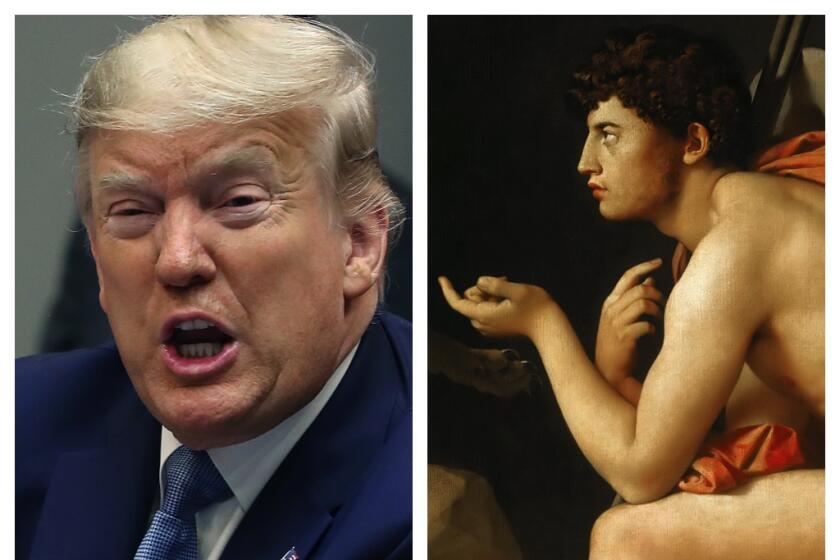Review: An impassioned musical revival of ‘The Gospel at Colonus’ draws from the book of Oedipus
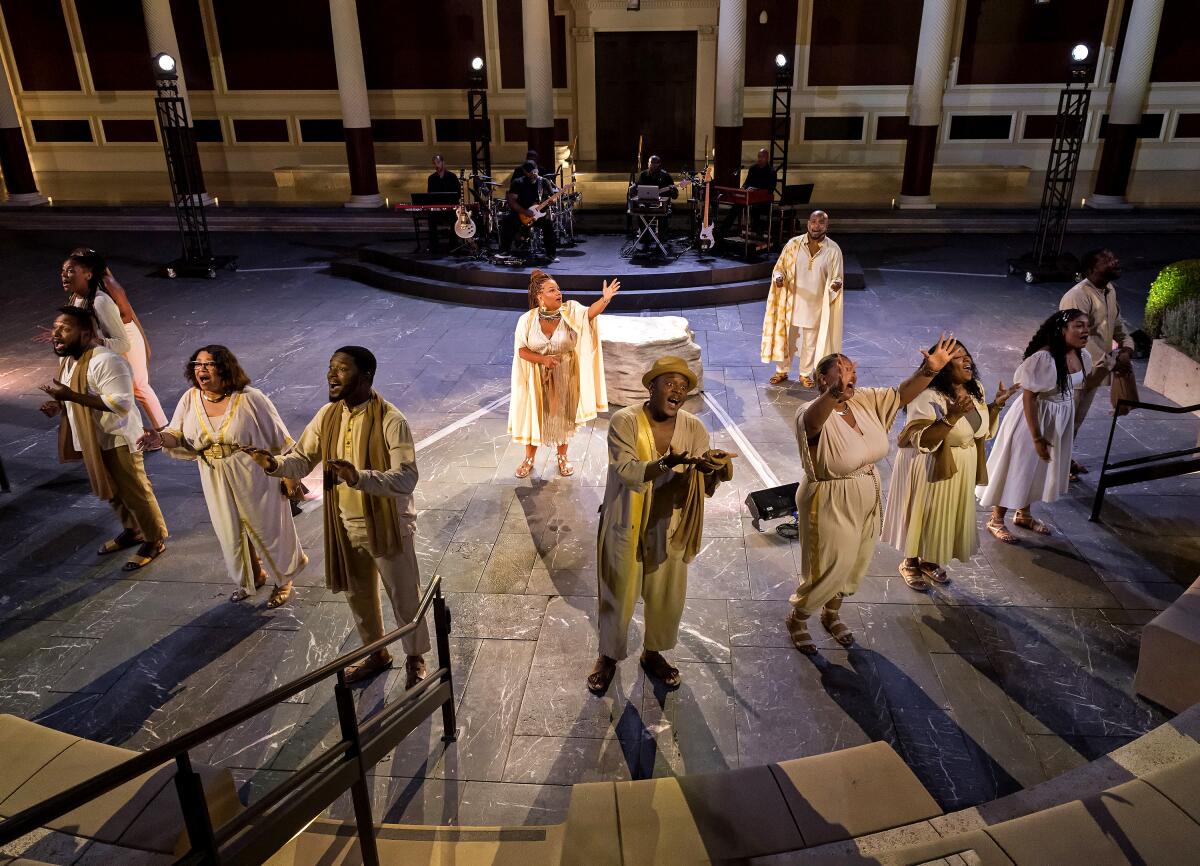
- Share via
Lee Breuer and Bob Telson’s “The Gospel at Colonus,” this year’s livelier-than-usual outdoor theater production at the Getty Villa, combines disparate ritual traditions. Ancient Greek tragedy is reformatted with the musical and storytelling rhythms of the Black Pentecostal church to bring us closer to the spirit of Sophocles’ art than the majority of academic revivals ever have.
Our knowledge of ancient Greek theater practice is sketchy, despite centuries of scholarly research. We study the texts of Sophocles plays, but fail to appreciate that they are the skeletons of a theatrical experience synthesizing music, dance and spectacle in a manner quite removed from our modern playgoing experience.
Breuer, an innovative director who was a founding member of the avant-garde theater troupe Mabou Mines, and Telson, a versatile composer and songwriter drawn to mercurial film and theater projects, chose “Oedipus at Colonus” for an experiment in adaptation. Sophocles’ play, written at the end of the playwright’s life and produced posthumously, invites bold reimagining.
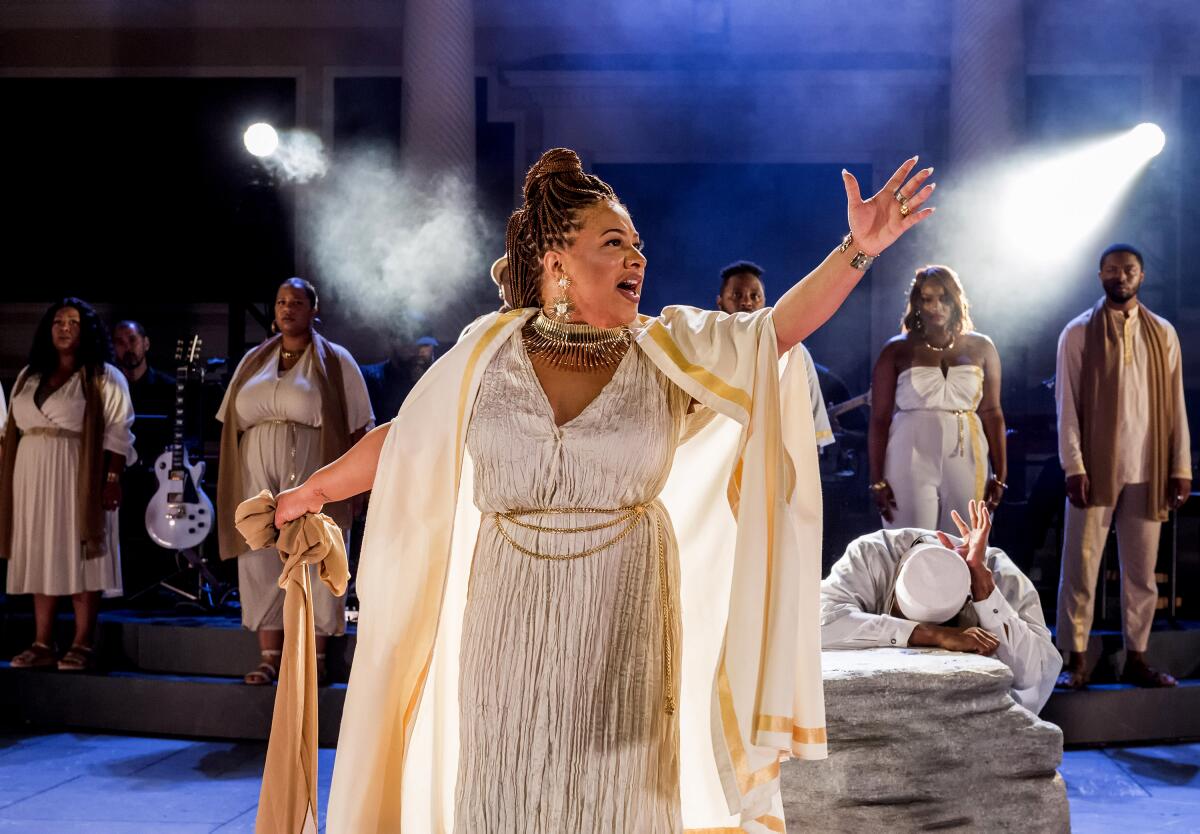
“Oedipus at Colonus,” which picks up the story long after Oedipus has gouged out his eyes and has been exiled from Thebes, a wanderer bearing the shame of incest and parricide, doesn’t abide by the structural conventions that Sophocles established in his earlier play “Oedipus the King.” Nor is the conflict as neatly organized as it is in “Antigone,” the last play in the trilogy but the first of the three works that Sophocles wrote. Each time the playwright returned to the Oedipus saga, he was compelled by a thematic idea that had no easy resolution.
In “Oedipus at Colonus,” Sophocles is consumed with the prospect of salvation after prolonged suffering. The play can be read alongside “Philoctetes,” another of the author’s late works that is similarly focused on a character whose agonizing life contains a miraculous benefit.
Both plays meditate on the paradox of how someone can be at once cursed and blessed. In “The Wound and the Bow,” an influential essay on Sophocles’ “Philoctetes,” Edmund Wilson articulated this conundrum in different terms, arguing that it reflected a conception of “superior strength as inseparable from disability.”
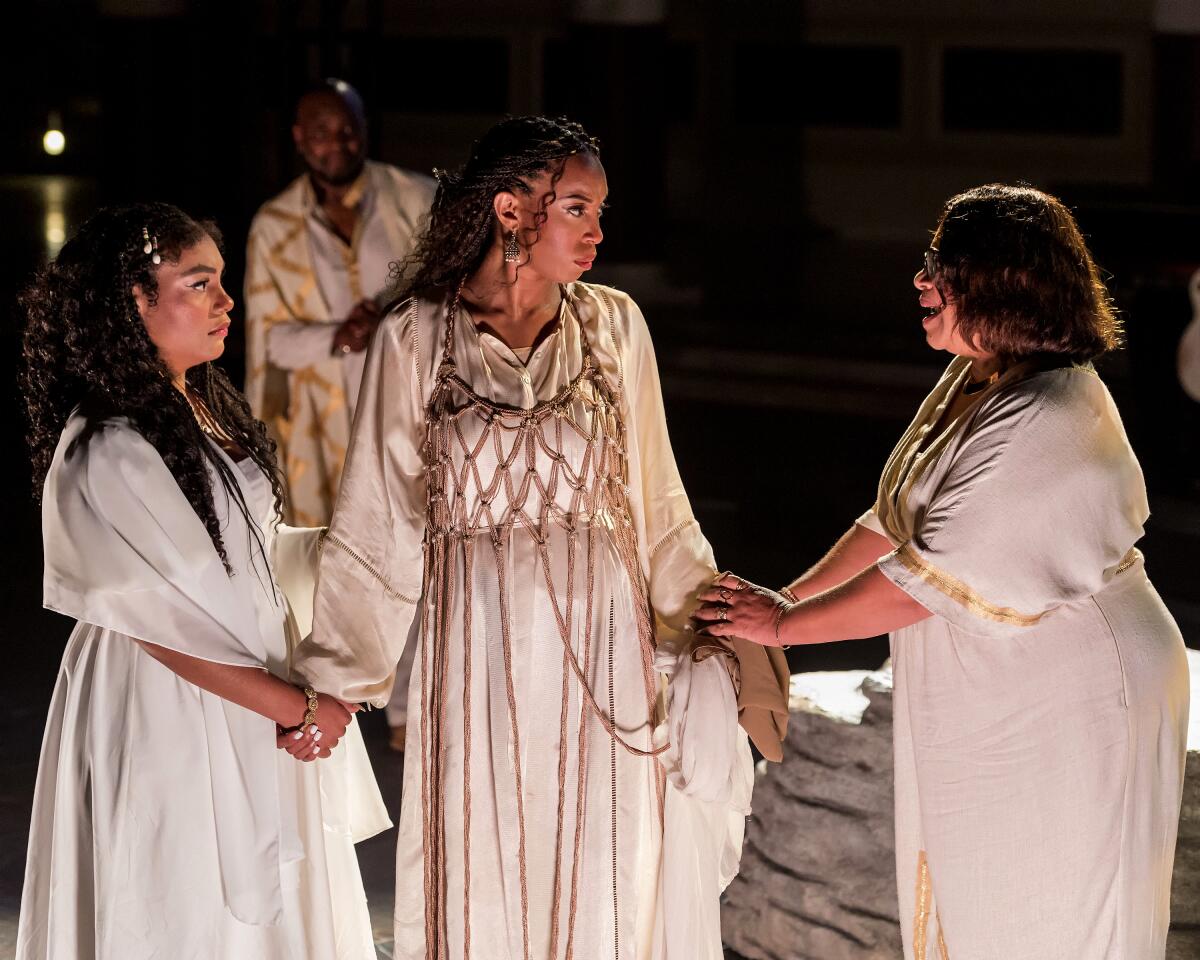
The connection between suffering and redemption is of course central to Christianity, making Breuer and Telson’s recontextualizing of the Oedipus story both resonant and curiously compatible. Breuer was inspired by Zora Neale Hurston’s writing about the relationship between Greek choruses and Black spiritual experiences.
“The Gospel at Colonus,” which premiered at the Brooklyn Academy of Music in 1983 and was presented on television in 1985 featuring crucial original cast members Morgan Freeman and Clarence Fountain, reveals the vibrancy of the theatrical parallels. The show introduces “the book of Oedipus” as though it were a sacred text in a religious service.
A production note in the published play describes the work as “an oratorio set in a Black Pentecostal service,” and that’s how the directing team of Mark J.P. Hood and Charles Newell (with associate director TaRon Patton) at the Getty Villa stage it.
A co-production with Chicago’s Court Theatre, this rousing revival probes the mystery of Sophocles for one clear goal: communal catharsis.
This is a theater event that wants to hear from the audience. The production makes room for call and response. The music, performed by an onstage band (at a volume that was a touch too low, perhaps to avoid complaints from nearby residents), is meant to lift people out of their seats when the spirit moves them.
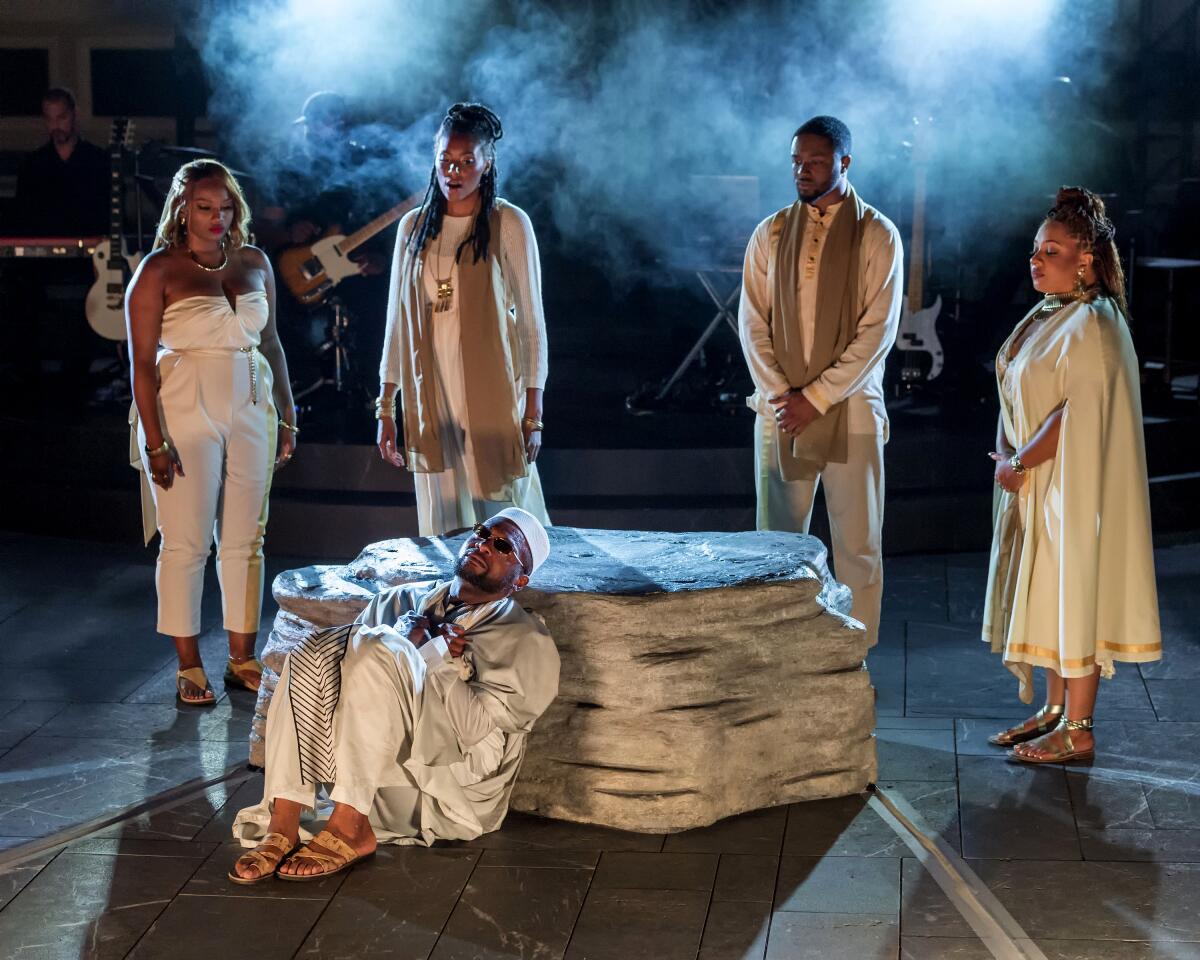
The chorus of powerhouse singers greet the audiences with beaming smiles and neighborly cheer. The communal spirit of the performers is extended to spectators. This warm embraces fosters a feeling of communion between the company and the audience.
You might feel occasionally that you’re shirking your duty as a parishioner if you’re not actively participating in the service. Occasionally, I wished that the emphasis would have shifted more to the drama than to the religious feeling it was engendering in the company.
Telson’s glorious gospel score engulfs the work, dictating its path and momentum. Breuer was more adept at working out his ideas in his staging than in his playwriting. This new revival departs from his plan of dividing Oedipus into two roles, Preacher Oedipus and Blind Oedipus. Now Theseus (a galvanizing Mark Spates Smith) performs the ministerial duties of Preacher Oedipus, leaving Kelvin Roston Jr. to occupy center stage as the poor, blind kingly beggar.
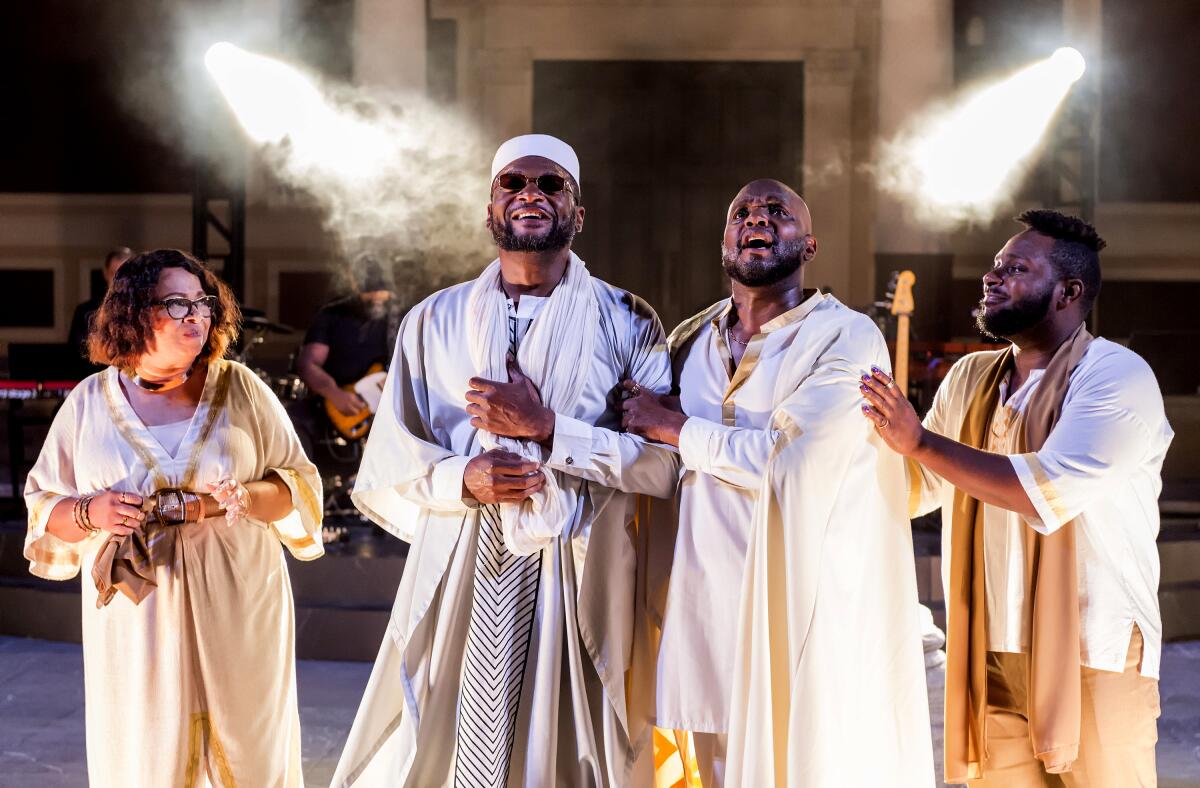
Anguish hangs on Roston’s Oedipus as somberly as his tattered garments. Aware of his objective guilt, he is just as keenly mindful that his horrific crimes were committed in innocence. He is a pariah who recognizes that he is also a sacrificial scapegoat.
When he arrives in Colonus, a wanderer led by his daughter Antigone (a commanding Aeriel Williams), he believes he has found his final resting place. His attitude is both meek and defiant as he ignores the warnings of the chorus about not treading upon holy ground. Finally attuned to his fate, Oedipus knows that his burial place will bring a blessing to the city. And so despite his stigma, his royal dignity and still-ferocious temper remain intact.
The Oedipus clan is formidably cast. Kai A. Ealy offers a puissant portrayal of Oedipus’ traitorous son Polynecies and Jason Huysman, donning a white suit and cruelly manipulative demeanor, makes a vivid impression as Creon. Ariana Burks as Oedipus’ less decisive daughter Ismene fleshes out this sorrowful family tale.
But singing eclipses speaking. Award-winning Gospel artist Shari Addison is part of a company of gifted musical performers who lift the audience up with voices that address God directly. The show makes for a heavenly night under the stars at the Getty Villa’s majestic Outdoor Theater, even if ultimately this outing is more musically sublime than dramatically gripping.
Amid the coronavirus, let us consider how the cornerstone text of Western literature is about a ruler discovering himself while confronting an epidemic.
'The Gospel at Colonus'
Where: Getty Villa Outdoor Theater, 17985 Pacific Coast Highway, Pacific Palisades
When: 8 p.m. Thursdays-Saturdays. Ends Sept. 30
Tickets: $45-$55
Information: (310) 440-7300 or https://www.getty.edu/museum/programs/performances/outdoor_theater.html
Running time: 1 hour, 30 minutes
More to Read
The biggest entertainment stories
Get our big stories about Hollywood, film, television, music, arts, culture and more right in your inbox as soon as they publish.
You may occasionally receive promotional content from the Los Angeles Times.
